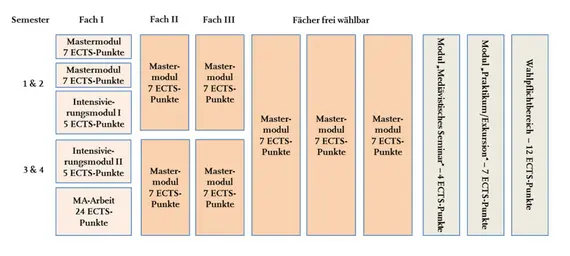Structure and Curriculum
The master’s degree programme in Interdisciplinary Medieval Studies provides you the opportunity to specialise in one subject yet acquire the knowledge and skills of a wide range of academic disciplines at the same time. You’ll encounter a wide variety of courses and many different electives among numerous participating disciplines that ensure you can build a programme tailored to you.
A self-selected focus area from each of the three thematic clusters will form the core of your studies. Additionally, you will attend seminars created specifically for this programme, which enable discussions with your fellow students and provide research-based insights into various disciplines. You will also take part in field trips to gain first-hand practical experience, and you can receive credit for several weeks of internship. You can also acquire further skills through your selections in the required elective component.
You can find a more detailed overview in the module handbook
As part of your studies, you will select one discipline out of each of the three thematic clusters. This means that a diverse range of combinations are possible (for example, Latin Studies, Medieval History and Medieval Art History). The aim is to open up the cultural, social, economic, political, philosophical and theological structures of the European Middle Ages to you in different ways.
Thematic cluster I: Linguistic structures and literary representation:
English Studies; German Language, Literature and Culture (literary studies/historical linguistics); Iranian Studies; Greek and Latin Studies; Romance Studies (Spanish/French/Italian); Slavic Studies (Russian/Polish/Czech/Croatian/Bosnian/Serbian)
Thematic cluster II: Historical sources and theoretical texts:
Medieval History, Auxiliary Sciences of History, Philosophy, Catholic Theology
Thematic cluster III: Material culture and visual representation:
Medieval and Post-Medieval Archaeology, Heritage Conservation Studies, Islamic Art and Archaeology, Art History
Read more on each of the participating disciplines.
These three modules are intended to give you an insight into other medieval subjects, away from your selected focus areas. You can therefore freely select three additional modules from the range of modules offered in the thematic clusters in the Medieval Studies master’s degree programme. In addition, you are also free to choose modules from Ancient History, Modern History or Arabic Studies.
A multidisciplinary series of medieval studies seminars is also aimed specifically at students within the Centre of Medieval Studies (ZEMAS). These seminars explore individual topics in a practice-oriented, research-based manner via the knowledge and approaches of different disciplines and promote interdisciplinary competencies and networking. Each seminar is held by teaching staff from a different sub-discipline of medieval studies; the programme, as a whole, intends to give students an impression of the diverse disciplinary aspects one topic can have. Furthermore, shorter block courses have also frequently been offered. These can be credited as the medieval studies seminar component, such as insights into various medieval languages.
Between two and four seminars can be selected as part of this module.
The required elective component is intended to be used to gain or consolidate transferable, professional, didactic and foreign language skills. As part of this component, you can
- receive credits for additional internship periods
- gain or develop language skills
- gain initial or further knowledge in the field of cultural informatics or applied computer science
- research religious traditions (Catholic Theology, Islamic Studies/Oriental Studies, Jewish Studies).
- or make a presentation at a medieval studies conference.
In field trips, you’ll discover current research first hand under practical conditions, for example in archives, museums, heritage sites, whole cities or research institutes. Visits to cathedrals, for example, enhance theoretical lessons held in seminar rooms. These chances to view original historical artefacts and sites are so important to us that you can expect to spend between nine and 21 full days on field trips.
In internships, you can gain professional experience, for example in libraries, museums, foundations, research institutes, companies, historical parks or other historical institutions. You can receive credit for four to 14 weeks of internships.
You write your master’s thesis on a topic from one of your chosen disciplines. The choice of topic and your approach can incorporate the interdisciplinary focus of the degree programme. The master’s thesis is an independent piece of written work that shows you have in-depth and sufficiently specialised knowledge in the subject you have studied within a discipline that is part of the Medieval Studies programme. It also shows that you are able to engage with medieval sources in their original form and apply the working methods of the subject and the relevant field of research to a complex, academic question in an independent and target-oriented way while using particular sources and the relevant specialist literature. Furthermore, it shows you are able to condense your findings into a coherent academic discourse and to present them in an appropriate manner.
In order to further strengthen your specialisation, you will also complete two additional modules in the same subject in which you write your master’s thesis.
Only for students without a bachelor’s degree in Medieval Studies
If you haven’t previously studied one or two of the disciplines you have selected from the thematic clusters in your bachelor’s degree, you must complete the respective foundation module of 7 ECTS for each. This then replaces one free elective module each (see above). The module contents and examination will be established in consultation with the programme coordinator.
